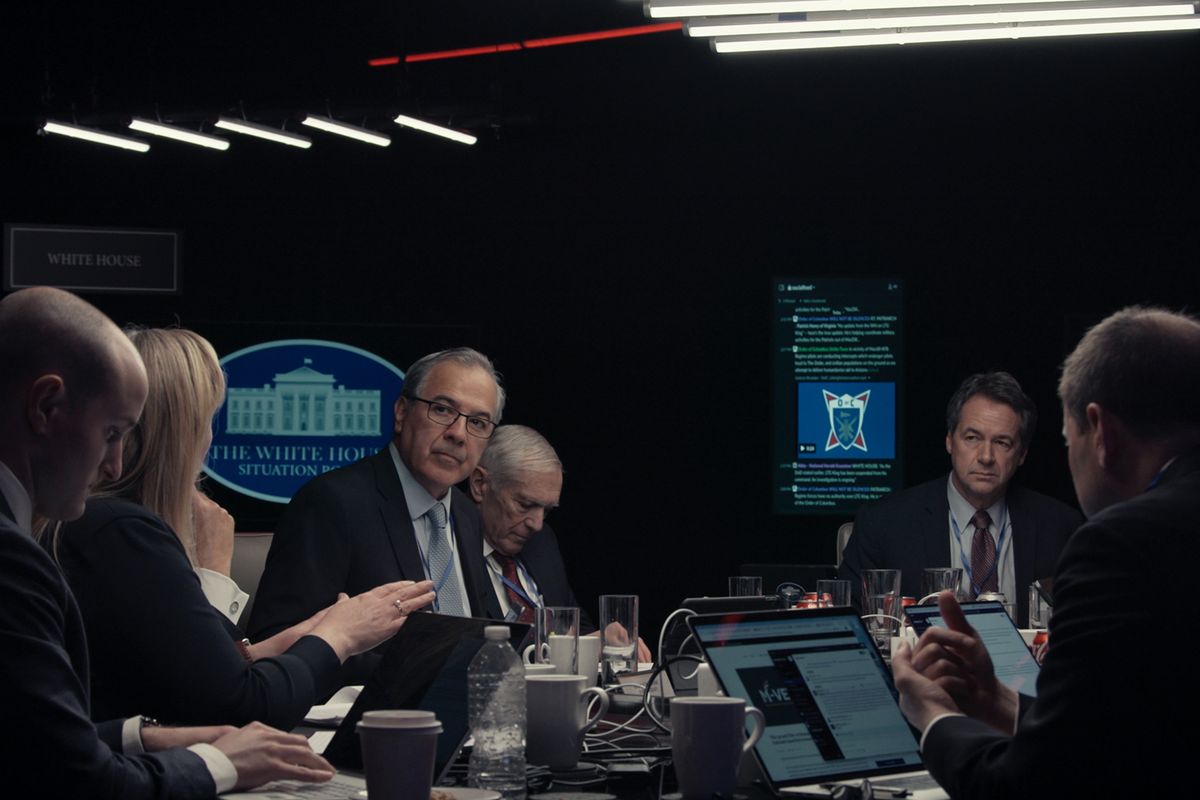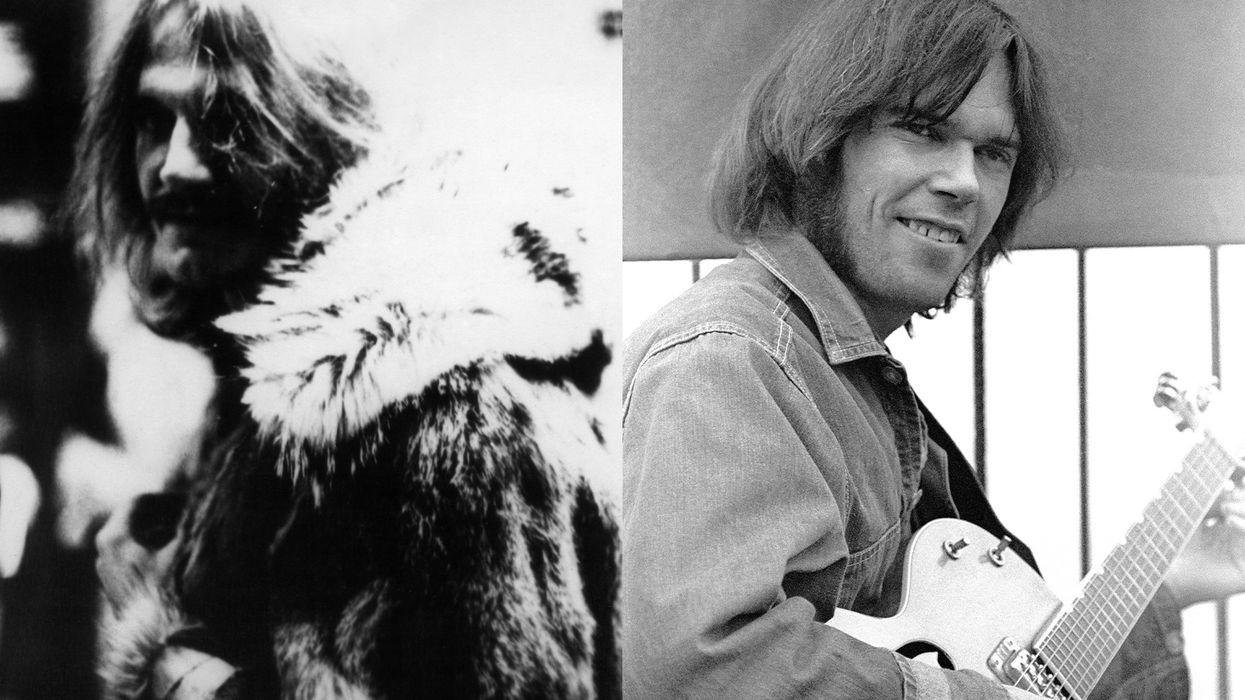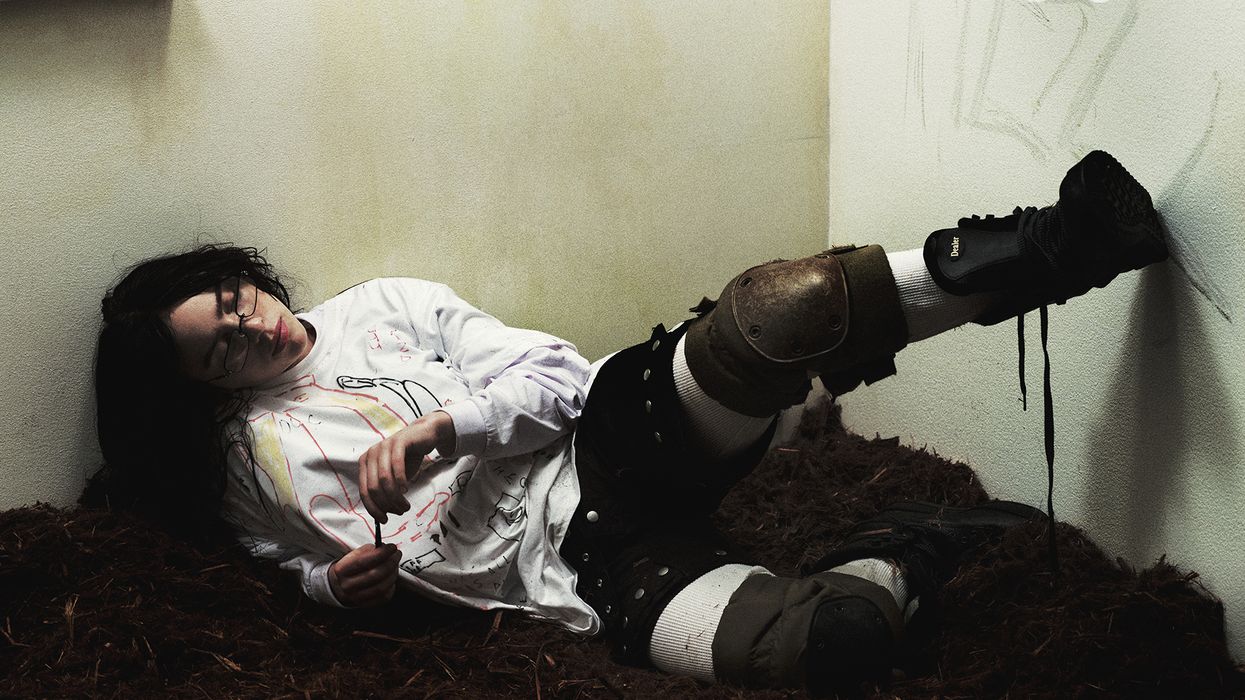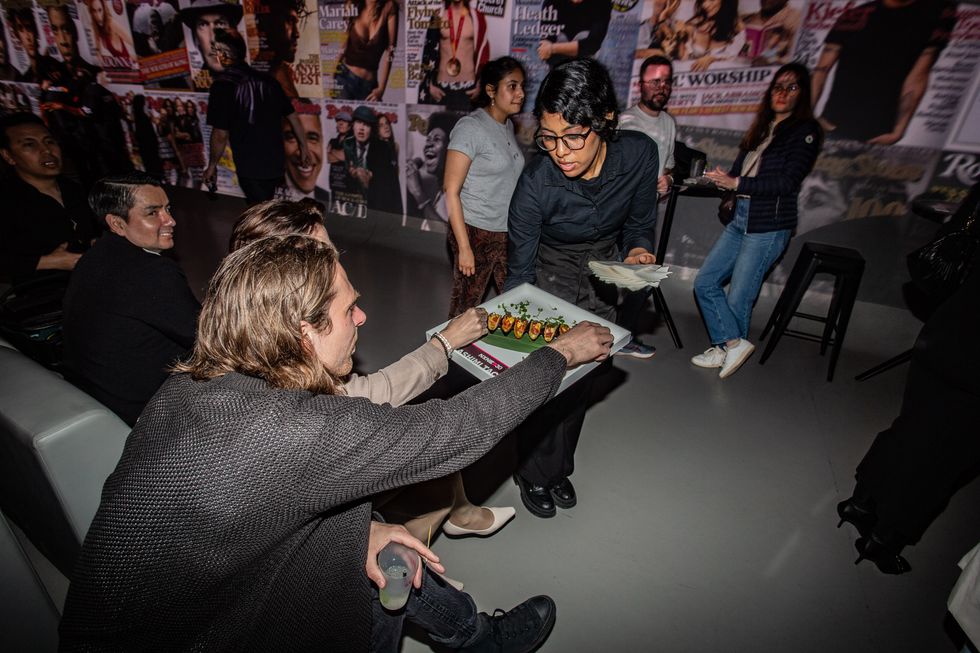The man standing at the podium has the steady, stentorian voice of an authority figure, someone who issues orders and expects them to be heeded without question, and the look of a zealot in his eyes. “My fellow Americans,” he intones, betraying a slightly Southern lilt gilded by fire and brimstone. “Faith is a gift from God to us. Purpose is the ability to put that power to use.” There are mentions of a stolen election, a coup in progress, an attempt to steal the freedoms of true patriots. He then appeals directly to the members of the U.S. armed forces, “to join with us to defend our liberty and land.” For a moment, this imposing orator stares silently into the camera, and you can practically see the visions of blood spilling onto our streets running through his head.
Then he looks slightly to his right, and in a warm, quiet tone (and refined British accent) asks, “Should I be friendlier?” The two guys filming him assure this would-be dictator that he sounded great. A female voice offscreen asks if everyone’s ok with that take. The man flanked by two red, white and blue flags casually bites into an apple.
War Game , the new documentary from Jesse Moss (Boys State) and Tony Gerber, opens with two questions: What if an insurrection, not unlike the one on Jan. 6, happened again on U.S. soil during an attempt to ratify a Presidential election — only this time, the military was actively involved in perpetrating it rather than defending the government against it? And if one were to imagine this situation via an unscripted exercise, would they be allowed to film it?
The answer to the second question is self-evident. Moss and Gerber are granted access to a roleplaying scenario coordinated by Vet Voice, an organization dedicated to (per their website) “empower[ing] Veterans across the country to become civic leaders.” Prompted by a Washington Post editorial written by three retired generals, the foundation and various consultants have set up a “war game” devised to imagine a bloodier, more complicated sequel to what happened at the Capitol in the early days of 2021. We watch a variety of former armed-forces officers, intelligence-community alumni, policy wonks, political activists and the occasional professional actor portraying both alt-right domestic terrorists and an administration on the brink of disaster. On one side, there is the “Order of Columbus,” an Oath Keepers-style fringe group that’s calling for “patriots” to rise up against what they consider to be a rigged election, and for members of the U.S. military to disobey any orders issued by the current commander-in-chief. On the other side, the incumbent POTUS and his advisors, who are dealing with an escalating catastrophe on the ground. They have six hours to avert a second civil war. The clock is ticking.
As for that first query, the hope is that this extended “stress testing [of] the National Security system” will reveal just how prepared the government is in terms of dealing with another, potentially better organized coup attempt. And that’s where War Game turns into something between a standard fly-on-the-wall documentary paced like a political thriller and a horror movie. Go back to the Op-Ed that inspired this speculative exercise, and the authors’ talk of rising extremism within the military ranks is chilling enough on its own. Combine that with online misinformation campaigns that multiply faster than they can be countered, and the possibility of coordinated attacks on state capitols that equal a battle being fought on a half dozen fronts, and you have the recipe for opportunistic chaos. Watching faux-terrorists sending out fake images of violence on social-media and a faux-POTUS fret over when and how to use the Insurrection Act — the “nuclear option,” per the game’s designer, that gets trotted out too fast for comfort — you aren’t exactly left feeling secure about our nation’s stability under fire. Quite the opposite.
Moss and Gerber do what most docmakers would do with this material, which is lean heavily into the timebomb aspects as things verge on spiraling out of control and life-and-death decisions about democracy have to be made in microseconds. The fact that they try to turn this material into something like Fail Safe 2.0 gives the film a momentum designed to keep viewers on the edges of proverbial seats, even if it occasionally makes this course in “Introduction to Coup Prevention 101” feel too slick and contrived by half. The entire, overwhelming “what if” concept, peppered with actual footage from the 2021 storming of the Capitol, is nerve-shredding enough on its own without smash cuts and a pulse-pounding soundtrack.
Thankfully, they also include testimonials from participants. Two stand out: Janessa Goldbreck is an ex-Marine who works with Vet Voice and is one of the game’s producers (she also voices Arizona’s governor, calling the White House in a panic as her office is breached). A dedicated service member unnerved by the possibility of fellow warriors turning against the government, she’s been a key advocate for identifying extremist strains and how to prevent them from metastasizing within the military. She’s also watched her father succumb to QAnon conspiracies and shares an email sent to her right before Jan. 6, in which he warns about civil war being right around the corner. The USMC taught her how to deal with all types of volatile crises, she says. It did not instruct her on how to deal with someone brainwashed in her own backyard.
The other is Kris Goldsmith, a bald, charismatic guy with a Bushwick-hipster’s beard who’s ID-ed simply as a US Army Veteran. He’s one of the men we see filming the demagogue preaching the wrath of God at the documentary’s beginning; his role is a sort of Minister of Propaganda for the fictional hate group. Like a lot of young men instantly politicized by 9/11, Goldsmith immediately enlisted and was sent to Iraq. The experience left him bitter, severely traumatized and disillusioned. He could have taken that rage and negative energy, he notes, and channeled it toward destructive, antisocial means. Instead, the veteran chose to use his experience to prevent unnecessary bloodshed abroad — and at home.
“The character that I play…is myself,” Goldsmith says. “I just interpret my history in a different way. I understand what led the insurgents down that path.” And listening to this smart, calm, rational guy talk about the appeal of revolution and madness, you find yourself going back to that earlier sequence in War Game, when the British actor is making his plea to God-fearing patriots to attack. The scariest moment isn’t when this fake hatemonger is preaching the gospel of insurrection. It’s when, after he’s broken character, he half-exclaims “I’m going to join up!” The self-motivation meta-joke inspires a laugh that sticks in your throat. War Game concentrates a lot on the “how to” part. But it also says a lot about how eerily easy and how horrifyingly relatable the “why” of it all is.














 Catering Presented By The Food DudesPhoto by Snapdrg0n
Catering Presented By The Food DudesPhoto by Snapdrg0n Catering Presented By The Food DudesPhoto by Snapdrg0n
Catering Presented By The Food DudesPhoto by Snapdrg0n Catering Presented By The Food DudesPhoto by Snapdrg0n
Catering Presented By The Food DudesPhoto by Snapdrg0n
 Photographer: Raphaëlle Sohier / Executive production: Elizabeth Crisante & Amanda Dorenberg / Design: Alex Filipas / Post-production: Bryan Egan/ Headpiece: Tristan Réhel
Photographer: Raphaëlle Sohier / Executive production: Elizabeth Crisante & Amanda Dorenberg / Design: Alex Filipas / Post-production: Bryan Egan/ Headpiece: Tristan Réhel Photo: Raphaëlle Sohier
Photo: Raphaëlle Sohier Photo: Raphaëlle Sohier/ Photo production: Bryan Egan/ Blazer:
Photo: Raphaëlle Sohier/ Photo production: Bryan Egan/ Blazer:  Photo: Raphaëlle Sohier/ Blazer: Vivienne Westwood/ Skirt :
Photo: Raphaëlle Sohier/ Blazer: Vivienne Westwood/ Skirt : 

